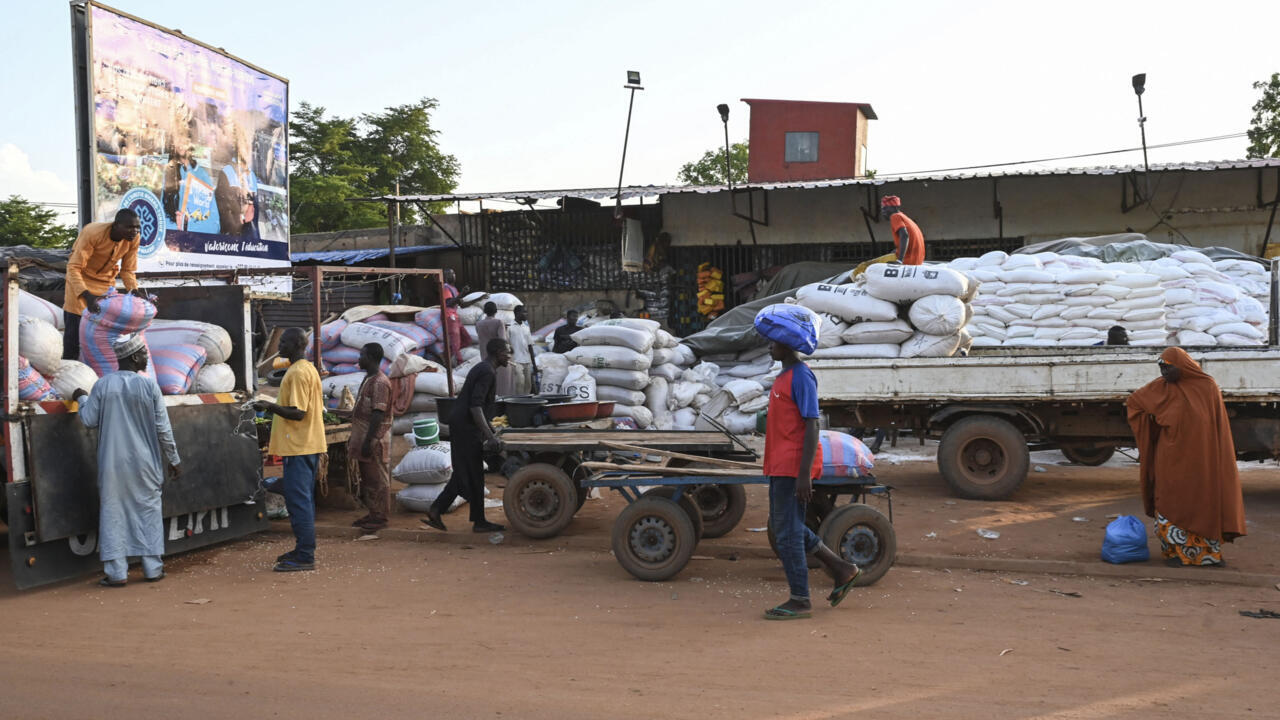Six months after the coup in Niger, the economy “shows remarkable resilience”
On July 26, 2023, the putschists of the National Council for the Safeguarding of the Fatherland (CNSP) took power in Niger, leading to regional and international sanctions. Six months later, on the economic level, the situation seems to have stabilized.
Despite the fears, the tensions of the first months after the putsch and the ECOWAS sanctions, Niger continues to be supplied with food. Here, workers unload bags of rice and flour in front of a store in Niamey, September 19, 2023. © AFP
By: Arthur Ponchelet
Advertisement
Read more
“
The sanctions did not have the expected effects
,” notes a Nigerien economic actor, six months to the day after the coup d’état in Niger. 184 days ago, on July 26, 2023, the soldiers of the National Council for the Safeguarding of the Fatherland (CNSP) overthrew the democratically elected president, Mohamed Bazoum, and took power.
Very quickly, the
Economic Community of West African States (ECOWAS) reacted
, with sanctions: freezing of Niger's assets with the BCEAO, closure of borders... The objective is clear: attack the junta in the wallet and push her to come to the discussion table.
“
The situation has stabilized
”
At the time, many observers were concerned about
the impact of the sanctions
, particularly on the population. Fears weighed particularly on food security in the country: with the
closure of the borders with Benin
, goods could no longer enter.
However, six months later, “
the situation has stabilized
,” says a local entrepreneur. Food inflation stood at around 7%. On the stalls of Niamey, a bag of rice costs around 12,000 CFA francs, compared to
19,000 in August 2023
.
Food prices are under control because in reality, the country continues to stock itself. The border with Nigeria is very porous: “
Only the tarmac roads have been closed, but foodstuffs continue to pass through
,” explains a source. Thus, trade in livestock, cereals and fresh produce continues with Nigerian traders.
In this context, the fall of the naira, the national currency, has also made it possible to reduce importers' bills. Harvests have also started in Niger and farmers are expecting a good year in 2024.
Convoys of “
3,000 trucks
” from Burkina Faso
The
border with Benin remains closed
, even if pedestrians can cross. They stopped at Malanville, crossed the river by canoe before being picked up by road companies at Gaya, on the Niger side. But the trucks remain stuck.
A situation denounced by Daouda Bamba, executive general secretary of the Union of West African Truck Drivers: “
The financial losses for the transporters have been considerable
,” he laments.
We demand that ECOWAS compensate drivers and road hauliers so that transport can continue in the region. We are not behind the coup, but we are the victims.
»
To supply the country, the junta instead relied on a new corridor: a few weeks after the coup d'état, the putschists organized convoys arriving from Burkina Faso. Trucks loaded with cereals, sugar and vegetable oils leave the ports of Lomé in Togo and Accra in Ghana, before passing through Burkina.
“
Last week, a convoy of 3,000 trucks arrived in Niamey
,” says a source.
Convoys like this happen every two to three weeks.
» This new corridor is essential for the junta, even if, due to the situation in the region, they must be secured at great cost.
Wages paid, liquidity problems in banks
In Niamey, life nevertheless continues, almost as before the coup. Power cuts, frequent after Nigeria stopped supplying electricity, are now almost non-existent. According to several sources, the authorities partly relied on the Gorou-Banda photovoltaic plant, inaugurated a few days before the putsch.
The sanctions also did not prevent civil servants from receiving their salaries, according to Djibril Idrissa, secretary general of the Democratic Confederation of Workers of Niger (CDTN).
“They continue to be paid, certainly in an elastic manner because there is a liquidity problem which arises at the level of the banks. Even if the transfer is made, the payment is spread over a certain number of days.
»
Banks have retained withdrawal limits, which vary depending on the establishment.
“Sometimes it’s 100,000 CFA francs, or even more
,” says Djirbil Idrissa. Liquidity problems which even force some companies to adapt the working hours of their employees, as they have to spend so much time in queues at banks to withdraw.
The business world at a time of sanctions
Businesses are suffering the effects of sanctions. In Niamey, many employees in the hotel and construction sectors are technically unemployed. “
Work on roads and infrastructure which relied on funds from international donors has come to a standstill
,” explains Djibril Idrissa. Several European Union countries have in fact
stopped their funding
to Niger.
The mining sector is also one of the activities that have suffered from the closure of borders. In September 2023, the Somaïr factory, nearly 64% owned by the French company Orano, had to modify its organization. Due to the reduction in its stocks of chemicals, the site has “
anticipated its maintenance operations
”, explains the group, which specifies that the situation has not changed since.
Despite the difficulties linked to sanctions, the economic life of the country continues. A situation which pushes an economist from a major institution, contacted by RFI, to affirm that “
the Nigerien state has demonstrated remarkable resilience
”.
Read also Withdrawal of French soldiers from Niger: review of three months of a complex disengagement
Newsletter
Receive all the international news directly in your inbox
I subscribe
Follow all the international news by downloading the RFI application
Share :
Continue reading on the same themes:
Niger
Economy
Economic crisis
Economy Africa
Abdourahamane Tiani
Commerce and Exchanges

